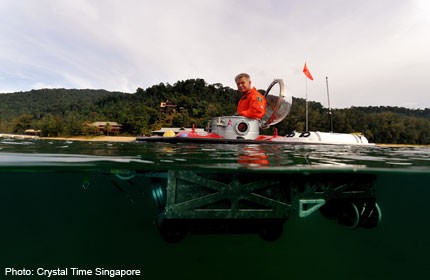Scott Cassell risk life to protect ocean life

A giant squid attack left his wrist broken in five places and his scalp lacerated. As he was covertly filming a poacher in action, his chest was pierced by a bow hook.
But ocean conservationist Scott Cassell says he never once feared for his life. Instead he thrives on dangerous situations.
"It was the most incredible headache," he said of the squid attack. "But human problems are temporary, fleeting and unimportant in the scheme of things. People just do not have a clue what the real problems are."
The 51-year-old explorer, film-maker and army operative who plays with sharks and hunts poachers was speaking to The Straits Times in Tioman, off the east coast of Malaysia.
There, he used his self-modified two-man submersible to study the health of corals.
Based in California, the American has clocked more than 13,000 hours underwater studying the ocean. His documentaries have been aired on Discovery Channel and National Geographic.
He knew from a young age that he wanted to be an ocean explorer, after reading Jules Verne's 20,000 Leagues Under The Sea. Growing up, he was also inspired by the late Jacques Cousteau, one of the most famous ocean explorers of the 20th century.
Mr Cassell's fearless and independent streak does not come from books. It stems from personal experience - his upbringing in an abusive family.
"My 15th birthday present was a broken jaw. I left the door open too long and my father punched me in the face," he said. "I got away as soon as I could and joined the military when I was 17."
The captain served as a combat diver for the United States Armed Forces Special Ops and volunteered for the Iraq War, where he saw his buddy get killed and was left partly paralysed in his left leg.
"I've taken an oath... to protect and defend the innocent even at the cost of my own life," he said. That oath now extends to sharks, with which he discovered a special affinity.
He once christened a 1,360kg shark Spots, after it responded to being stroked while he was filming it for a documentary. He played catch with it, much as one would with a dog, using a licence plate found floating in the sea.
In April 2011, it was killed by poachers for its fins and teeth.
Even now, thinking about that saddens Mr Cassell.
"More than 100 million people have watched her on television, usually with me hanging on her back. Still, nobody could save her."
He lauded a move by the Hong Kong government last Friday to ban shark's fin from official functions. "It is not only the right thing to do environmentally - it also takes moral courage."
His own courage shines through in his fight against illegal poachers off Mexican waters, filming them in action so they can be prosecuted. "It plays on their psychological fears of being watched - they never know where I am."
So far, more than 30 poachers have been caught through his actions, and 16 convicted, he said.
Even so, this is only part of the battle. He wants to change the image of the shark as a feared man-eater - an image perpetuated by movies such as Jaws.
"Humans have never been their natural prey," he said. "They have never been man-eaters - seals are actually their natural prey. They might sometimes mistake humans for seals with tragic consequences."
He said sharks provide a necessary balance in the ocean system, preventing an explosion in numbers of another giant predator, the Humboldt squid, which he has studied for more than a decade.
In 2007, he had a close encounter while taking tissue samples from baby squids. A huge one sailed by and he stabbed it with a needle, which he said must have "pissed it off".
He has toured the region - with stops in Brunei, Singapore, Malaysia, China and now Manila - to promote ocean sustainability under the Save The Seas conservation programme by Luminox. He is the watch company's brand ambassador.
In the US, he runs the non-profit Undersea Voyager Project, which studies the health of oceans and educates the public about the importance of preservation. His dream is for every country to have its own version of the project, to boost the cross-border sharing of data and analysis.
As part of the project, he has created a self-modified two-man submersible that can travel to a depth of 175m. Built with the help of an engineer, it was improvised out of recycled materials such as plastic boards and a porch that had been torn apart. Mr Cassell named it Spots, after the shark.
"It won't win a beauty contest as it's not a Ferrari, but its functionality makes it beautiful," he said, adding that he is keen to recreate the submersible - with new materials this time - for anyone in the region who can fork out US$250,000 (about S$317,600).
"I'm not worried that it might become a rich man's toy, (as long as) he lets other people use it as a research tool or to inspire youth."
He has no fear on that front, but he is not immune to emotion. "It was when I almost lost my fiancee last December in a scuba diving accident," he said.
"She inhaled enough water to kill two people. When I rushed her to the surface, her every breath was gurgling. The last time I heard that, one of my friends had been shot in the chest."
waltsim@sph.com.sg

Get a copy of The Straits Times or go to straitstimes.com for more stories.